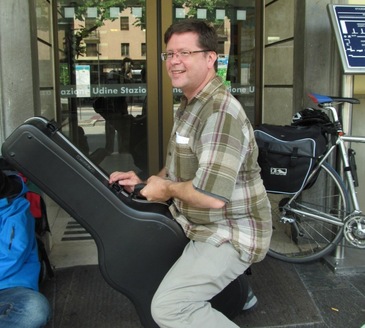But when I finally get to the window, the schoolmarm-ish clerk, dark-brown hair in a bun, eyes me over her reading glasses as if I haven’t done my homework. “You have to take a bus from Udine to the Austrian border town of Villach, then board a second train.”
“But all the internet timetables indicate a direct train.”
“Well, the bus is owned by Austrian State Railways, so it’s the same.”
Sure, ironclad logic. I resist the urge to roll my eyes.
When I arrive in Udine, there’s no indication where I’m supposed to catch the bus, no personnel on the train platform to ask. I consult a snack bar owner, communicating in gestures, rudimentary English and crude Italian.
I trudge two blocks with my thirty-pound backpack, computer case and, most important of all, my guitar. My companion, “Emilia.” Classical Yamaha with built-in tuner. The nylon strings give her the warmth I want for Gypsy music. Got her two months ago for this trip. Spent an extra hundred-fifty on the sturdy, TSA-approved black case to keep her in pristine condition.
In front of the bus station, Croats, Germans and Italians crowd around a concrete island, searching for a posted schedule that mentions Villach. Eventually we all agree the bus has to stop somewhere within sight, and it can’t possibly leave us all behind.
A rumor circulates that it’s an hour late, and we passengers start lounging on the dusty steps to the station entrance. I chat with a Mexican, a tenor studying in Bologna, now travelling to his next appearance in Cracow. An opera singer—must be a good omen. I have him take a picture of me, the Galloping Gypsy, “riding” the guitar case like a horse.
When the bus finally arrives, the driver starts stowing luggage in the compartment underneath, but he’s not giving out claim tickets. I really have no choice but to trust Emilia to Austrian State Railways.
When we arrive at Villach, the driver unloads suitcases, rucksacks, a cardboard box, a massive duffel bag, my guitar. Travelers bump elbows in a frenzy to grab belongings. The driver, running out of room, sets my backpack way off to the side.
I pick it up and make a beeline across the street, through the railway station to the much-needed WC. As I finish my business and turn towards the sink, I realize, Where’s Emilia?
I snatch up my remaining things and hustle back through the station. Did I set the guitar down somewhere absent-mindedly? Did someone make off with it while a partner-in-crime distracted me? I retrace my footsteps until I reach the bus terminal. The bright-yellow coach I just took from northern Italy pulls away. I wave my one free hand frantically at the driver. I'm a mere twenty feet from his windshield, but he doesn't notice. A cloud of dust billows in his wake like smoke in a magician’s act. Poof! The platform is empty. My guitar has vanished.
Emilia, how could I neglect you like this!
I go straight to the station office. This is a small town where most folks speak only German. Thank God, I learned my conjugations and declensions thoroughly in college. But now, I need to communicate quickly and accurately. To locate the guitar – if possible – before it gets permanently lost or stolen. The situation reminds me of an official oral proficiency test.
Recent language pedagogy has focused on communicative tasks that learners should be able to perform. A beginner can explain the basics about family and hobbies, an intermediate student can tell a story in the past tense, etc. At the advanced level, you have to be able to solve problems with significant complications. My German test goes as follows:
Part 1: Explain to the railway security official that you lost your guitar, or that it was stolen--you’re not sure. Tell him how you got to Villach and suggest that perhaps the driver put it back on. Be prepared to describe your guitar case.
Part 2: Hurray, the security guard has radioed ahead to Klagenfurt, the bus’s final destination. They’ve found your guitar and will put it on the next train back to Villach. OOPS! PROBLEM: You now have to explain that you’re continuing to Vienna. You should also apologize for not saying so earlier.
Part 3: Follow the officer’s instructions (in German): Get on the first car after the dining car. When the train stops in Klagenfurt, step off, look around for an official in a blue uniform. Wave your hands to get his attention if he doesn’t see you. He should have your guitar.
It works! Now, if you’ll excuse me, I’ve got to get back to my guitar—I must devote more time to Emilia, caress her strings, after so carelessly abandoning her.


 RSS Feed
RSS Feed